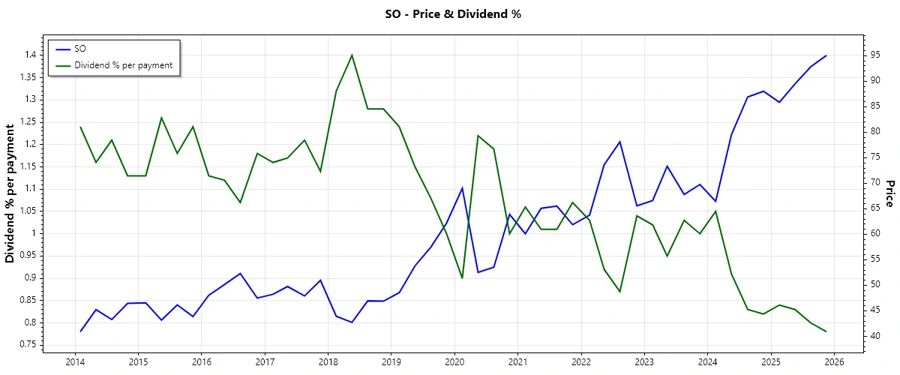October 31, 2025 a 02:47 am




SO: Dividend Analysis - The Southern Company

The Southern Company has a strong dividend history with a current yield of 3.09%. As a utility company, it has provided consistent dividends for over four decades, portraying stability in shareholder returns. Despite high payout ratios, it continues to commit to its dividend targets, supported by its sector's resilience.
📊 Overview
The Overview section provides essential insights into the company's industry and financial standing. A committed approach in the utilities sector strengthens its consistent dividend payments.
| Parameter | Value |
|---|---|
| Sector | Utilities |
| Dividend yield | 3.09 % |
| Current dividend per share | 2.70 USD |
| Dividend history | 44 years |
| Last cut or suspension | None |
🗣️ Dividend History
The Dividend History reveals the consistent payment strategy of The Southern Company, highlighting its stability over the years. This consistency boosts investor confidence.

| Year | Dividend per share (USD) |
|---|---|
| 2025 | 2.94 |
| 2024 | 2.86 |
| 2023 | 2.78 |
| 2022 | 2.70 |
| 2021 | 2.62 |
📈 Dividend Growth
The Dividend Growth metrics provide insight into future payout potentials and the company’s ability to increase returns to shareholders. Moderate growth indicates stability.
| Time | Growth |
|---|---|
| 3 years | 2.96 % |
| 5 years | 3.06 % |
The average dividend growth is 3.06% over 5 years. This shows moderate but steady dividend growth.

✅ Payout Ratio
Examining the Payout Ratio assists in assessing sustainability of dividends. The company relies heavily on its earnings to fund dividends.
| Key figure | Ratio |
|---|---|
| EPS-based | 66.61 % |
| Free cash flow-based | 213.00 % |
The high Free Cash Flow-based payout ratio suggests potential liquidity risks, but the EPS-based payout of 66.61% is within a manageable range evidencing some degree of caution.
⚙️ Cashflow & Capital Efficiency
The analysis of Cashflow & Capital Efficiency explores how effectively the company manages its capital expenditures and cash flow generation.
| Year | 2022 | 2023 | 2024 |
|---|---|---|---|
| Free Cash Flow Yield | -2.11% | -2.01% | 0.92% |
| Earnings Yield | 4.60% | 5.19% | 4.88% |
| CAPEX to Operating Cash Flow | 125.72% | 120.42% | 91.49% |
| Stock-based Compensation to Revenue | 0.43% | 0.54% | 0.49% |
| Free Cash Flow / Operating Cash Flow Ratio | -25.72% | -20.42% | 8.51% |
Recent improvements in Free Cash Flow Yield suggest a better cash flow management trend, vital during economic uncertainties.
⚠️ Balance Sheet & Leverage Analysis
This section helps evaluate financial resilience, particularly how well the firm can handle its debt obligations.
| Year | 2022 | 2023 | 2024 |
|---|---|---|---|
| Debt-to-Equity | 1.94 | 2.02 | 2.00 |
| Debt-to-Assets | 0.44 | 0.46 | 0.46 |
| Debt-to-Capital | 0.66 | 0.67 | 0.67 |
| Net Debt to EBITDA | 5.55 | 5.33 | 4.93 |
| Current Ratio | 0.66 | 0.77 | 0.67 |
| Quick Ratio | 0.49 | 0.53 | 0.46 |
| Financial Leverage | 4.44 | 4.43 | 4.37 |
The persistent high debt levels indicate potential leverage risks, although a steady Net Debt to EBITDA trend signifies better debt repayment capacity.
🏛️ Fundamental Strength & Profitability
An analysis of profit margins and return ratios elucidates potential for future growth and profitability.
| Year | 2022 | 2023 | 2024 |
|---|---|---|---|
| Return on Equity | 11.63% | 12.64% | 13.25% |
| Return on Assets | 2.62% | 2.85% | 3.03% |
| Net Margin | 12.07% | 15.74% | 16.47% |
| EBIT Margin | 21.33% | 26.89% | 29.83% |
| EBITDA Margin | 35.21% | 46.64% | 49.54% |
| Gross Margin | 36.30% | 46.36% | 49.93% |
| R&D to Revenue | 0% | 0% | 0% |
Steady improvement in profitability ratios like Return on Assets and Margins point towards efficient operational management, reinforcing investor confidence in long-term growth potential.
📉 Price Development

📊 Dividend Scoring System
| Criteria | Score | Visual |
|---|---|---|
| Dividend yield | 4 | |
| Dividend Stability | 5 | |
| Dividend growth | 3 | |
| Payout ratio | 2 | |
| Financial stability | 3 | |
| Dividend continuity | 5 | |
| Cashflow Coverage | 2 | |
| Balance Sheet Quality | 3 |
Total Score: 27/40
📣 Rating
The Southern Company maintains a consistent dividend but is limited by high cashflow payout pressure, resulting in an overall moderate risk profile for dividend sustainability. Long-term investors focusing on stable income may find it an attractive option while being mindful of liquidity risks.
